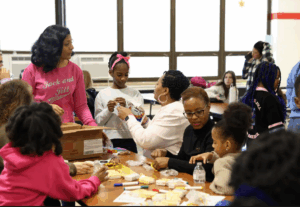COVID-19 and the Switch From Standardized Testing to Performance-Based Assessments

George Farmer
By George Farmer | AC JosepH Guest Blogger
COVID-19, a respiratory illness caused by the coronavirus, has upended education across the country. Many states have decided social distancing through virtual learning is the best safeguard to combat COVID-19. Governors across the country have announced the closure of its schools. Most have closed until further notice; the CDC suggests a minimum of eight weeks.
During an evolving influenza pandemic, community mitigation strategies, such as social distancing, can slow down virus transmission in schools and surrounding communities.
As parents, educators, and students adjust to the new normal of virtual learning, there will come a time when the country returns to social norms, which include traditional education inside the walls of a school building. If the current predictions hold, schools will resume in-person instruction sometime between April and May, which places some districts across the country in precarious positions for standardized testing.
While virtual learning provides teachers the opportunity to connect with their students and parents, there are limitations of virtual education. The individualized personal instruction is absent; restricting teachers from understanding if students are mastering academic standards. Also, the reliability of parents to teach new content is unrealistic.
Parents often complain about the evolution of education based on their educational experiences. Rote memorization is a practice of the past as explaining and justifying answers are now required to produce more higher-ordered thinking outcomes, therefore, limiting distance learning to spiral content.
Remote learning, at its best, is utilized to unify parents and educators to close educational gaps. As educational norms are disrupted, how should the government respond to standardized testing due to remote learning caused by COVID-19?
The Department of Education has enabled all governors to waive standardized testing for the 2019-2020 school year. Washington Governor Jay Inslee has canceled state testing. Texas soon followed with its cancellation of state testing. California’s Governor, Gavin Newsome, issued an executive order to waive state testing for the 2019-2020 school year in direct response to COVID-19. Following these cancelations, President Trump soon declared states could cancel standardized testing.
The implication is not that the 2019-2020 school year is a lost academic year. The nation must recognize the drastic change of country since the first reported case on January 21st, 2020, and how COVID-19 has changed education post-January 21st, 2020. Measuring student growth must remain a priority, and accountability for remote learning is imperative. How then should states assess the growth of students in consideration of COVID-19?
Performance-based assessments allow students to demonstrate mastery of standards through higher-order thinking. Performance-based assessments will enable districts to assess specific standards associated with core subjects to measure student growth. Implementing performance-based assessments alleviates the pressure and stress of having districts reconfigure curriculum maps and pacing guides that merely expose students to eradicated standards during the social distancing forced by COVID-19. Performance-based assessments can measure the effectiveness of educators while measuring student mastery of content covered before mandated social distancing.
Performance-based assessments assess more than content knowledge when compared to a standardized test. Performance-based tasks can measure students’ habits of mind, requiring students to use high-level thinking to perform, create, or produce something with transferable real-world application. States can still hold the autonomy to develop the performance-based assessments and narrow the evaluations to the content presented before school closures.
Performance-based assessments take limitations off of learning and allow students to apply the common core standards in real-life applications. Regardless of if schools resume this school year or if remote learning continues until the end of the 2019-2020 school year, performance-based learning is applicable. States can assess schools on the standards taught from the beginning of the school year until the institution of remote learning caused by COVID-19. If states use independent auditors, they can decide if submitted works accurately measure content standards.
To implement performance-based assessments, schools/districts should:
*Determine which common core standards from all three core subjects schools should assess
*Create three products or scenarios for each grade level for students to choose
*Create a rubric to ensure expectations for assignments are known and met
As standardized testing is the primary measurement for student success, consider the impact of COVID-19. It is impossible to measure the 2019-2020 school year without considering the ramifications of COVID-19 on school districts. It is impossible to measure what students mastered without thinking about, which drastically affected student learning more, the impact of educators on student learning versus the effect of COVID-19 on education.
COVID-19 has significantly changed the lives of every American. Every aspect of life has adjusted to the ramifications of COVID-19. Educators must quickly come to reality and make the necessary adjustments to waive standardized testing for the 2019-2020 school year and create new measurements that fairly assess student mastery of grade-level standards.
Bio- George Farmer is an administrator at an elementary school in Camden, New Jersey. Farmer has dedicated over a decade in education teaching kindergarten through 12th grade. He is a doctoral student specializing in educational leadership.
Note from AC Joseph Media: If you like this story and others posted on Front Runner New Jersey.com, lend us a hand so we can keep producing articles like these for New Jersey and the world to see. Click on Support FRNJ and make a contribution that will go directly in making more stories like this available. Thank you for reading.




